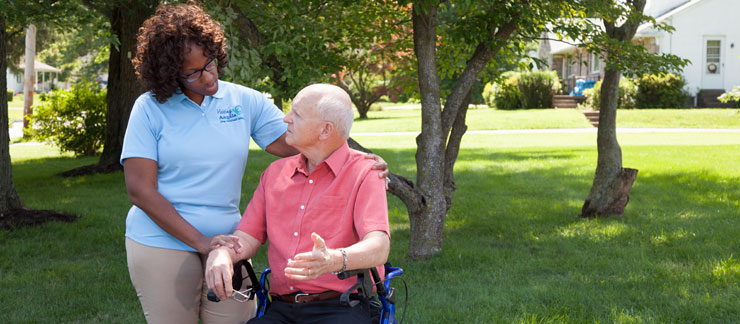Home Care & Early-Onset Dementia
Every day, Visiting Angels caregivers provide dementia care for Americans coping with memory disorders. Most of the time, our dementia home care services are provided to seniors. But in many cases, our care is for those with early-onset dementia.
Early-onset dementia is rare, but more common than some people believe. Roughly 1 in every 20 Americans coping with dementia is under the age of 65. While most early-onset cases occur in people’s 50s or early 60s, some adults experience early-onset dementia as young as 30 or 40 years old.
If you’re the spouse, parent, or child of someone coping with early-onset dementia, you will likely face extraordinary day-to-day challenges, especially as your loved one’s condition progresses. To help manage these challenges, you might consider the help of a professional caregiver. Below, Visiting Angels’ home care specialists have outlined some of the things you should consider when considering dementia care for early-onset dementia.
When Is Home Care Needed for Early-Onset Dementia?

Early-onset dementia can leave you feeling stranded without a roadmap, so it can be difficult to know when home care is necessary. The answer varies from case to case, but there are signs that you should be mindful of…
- You find yourself overwhelmed, exhausted, and struggling to function.
- You have noticed a significant decline in your physical well-being.
- You can no longer take care of yourself because of your care responsibilities.
- You are worried to leave your loved one at home alone.
- Your source of income is at risk due to the time you spend on care.
Primary caregivers sometimes put off hiring professional home care. Often, particularly for spouses, there is a sense of guilt attached to hiring an outside caregiver. However understandable these thoughts may be, providing care all on your own is untenable for most people. If you’ve noticed any of the above signs or think that a professional caregiver could help, we strongly encourage getting in touch with a local care provider.
How Will Home Dementia Care Help?
A specialized home dementia care program will provide your loved one with physical assistance, emotional support, and compassionate memory care in your absence. Specialized dementia care is typically performed by caregivers who have received training in different types of dementia and care strategies that make it easier for clients to cope with the ups and downs of their condition.
Professional care for early-onset dementia can also be invaluable for family caregivers. Part of being a good caregiver is taking the time to care for yourself — making sure you have the strength, energy, and emotional wherewithal to care for your loved one. Part-time professional care will give you the chance to recharge and recuperate, making it possible for you to give your loved one the quality of care he or she deserves.
Handling the Costs of Home Dementia Care
Cost can be one of the biggest stumbling blocks to any type of home care. Thankfully, private insurance or government assistance can help cover the cost of early-onset dementia care in most cases. You will need to contact your insurer to see if you are eligible for private care coverage. Government assistance is provided through Medicare. To become eligible for Medicare, you’ll need to apply for Social Security Disability. Your Medicaid eligibility will be determined by your finances.
How you schedule care can also make paying for care more manageable. A quality care specialist or agency will work with you before starting care to map out how you and your loved one can get the most out of a part-time care plan and how to schedule care around cost concerns.













